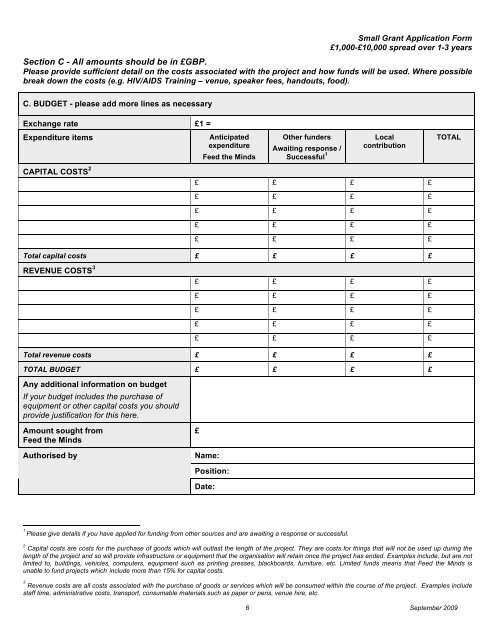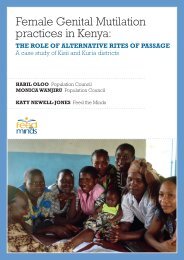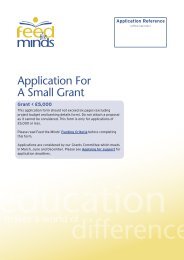Small Grants Application Form - Feed the Minds
Small Grants Application Form - Feed the Minds
Small Grants Application Form - Feed the Minds
You also want an ePaper? Increase the reach of your titles
YUMPU automatically turns print PDFs into web optimized ePapers that Google loves.
<strong>Small</strong> Grant <strong>Application</strong> <strong>Form</strong><br />
£1,000-£10,000 spread over 1-3 years<br />
Section C - All amounts should be in £GBP.<br />
Please provide sufficient detail on <strong>the</strong> costs associated with <strong>the</strong> project and how funds will be used. Where possible<br />
break down <strong>the</strong> costs (e.g. HIV/AIDS Training – venue, speaker fees, handouts, food).<br />
C. BUDGET - please add more lines as necessary<br />
Exchange rate £1 =<br />
Expenditure items Anticipated<br />
expenditure<br />
CAPITAL COSTS 2<br />
<strong>Feed</strong> <strong>the</strong> <strong>Minds</strong><br />
6<br />
O<strong>the</strong>r funders<br />
Awaiting response /<br />
Successful 1<br />
Local<br />
contribution<br />
£ £ £ £<br />
£ £ £ £<br />
£ £ £ £<br />
£ £ £ £<br />
£ £ £ £<br />
Total capital costs £ £ £ £<br />
REVENUE COSTS 3<br />
£ £ £ £<br />
£ £ £ £<br />
£ £ £ £<br />
£ £ £ £<br />
£ £ £ £<br />
Total revenue costs £ £ £ £<br />
TOTAL BUDGET £ £ £ £<br />
Any additional information on budget<br />
If your budget includes <strong>the</strong> purchase of<br />
equipment or o<strong>the</strong>r capital costs you should<br />
provide justification for this here.<br />
Amount sought from<br />
<strong>Feed</strong> <strong>the</strong> <strong>Minds</strong><br />
Authorised by<br />
£<br />
Name:<br />
Position:<br />
Date:<br />
1 Please give details if you have applied for funding from o<strong>the</strong>r sources and are awaiting a response or successful.<br />
TOTAL<br />
2 Capital costs are costs for <strong>the</strong> purchase of goods which will outlast <strong>the</strong> length of <strong>the</strong> project. They are costs for things that will not be used up during <strong>the</strong><br />
length of <strong>the</strong> project and so will provide infrastructure or equipment that <strong>the</strong> organisation will retain once <strong>the</strong> project has ended. Examples include, but are not<br />
limited to, buildings, vehicles, computers, equipment such as printing presses, blackboards, furniture, etc. Limited funds means that <strong>Feed</strong> <strong>the</strong> <strong>Minds</strong> is<br />
unable to fund projects which include more than 15% for capital costs.<br />
3<br />
Revenue costs are all costs associated with <strong>the</strong> purchase of goods or services which will be consumed within <strong>the</strong> course of <strong>the</strong> project. Examples include<br />
staff time, administrative costs, transport, consumable materials such as paper or pens, venue hire, etc.<br />
September 2009




